| Srl | Item |
| 1 |
ID:
122539
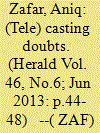

|
|
|
| 2 |
ID:
139725
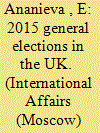

|
|
|
|
|
| Summary/Abstract |
Labour, Lib-Dems and UKIP suffered a crushing defeat, along with the analysts (me included) who had never expected that the Tories would win by a vast majority to knock together a one-party cabinet. For at least a month and a half before the elections, all public opinion polls indicated that the two leading parties were running neck and neck, so to speak with about 33-34 percent of the voters prepared to support either Labour or Tories. The aggregate rating of the smaller parties (slightly less than 70 percent) indicated that they stood a good chance to get a place in the sun.
|
|
|
|
|
|
|
|
|
|
|
|
|
|
|
|
| 3 |
ID:
135572
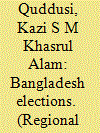

|
|
|
|
|
| Summary/Abstract |
In 1991, an interim arrangement called the caretaker system was introduced in Bangladesh to facilitate the transition from dictatorship to democracy. Following the scrapping of this system, the journey of Bangladesh democracy continued a bumpy ride, cantering around the around the holding of tenth general elections. The awami league (AL) and the allies were adamant on holding the general elections under elected people at the helm while the Bangladesh nationalist party (BNP) and allies were not prepared to budge an inch in bringing back the non-party caretaker system. in fact, even after restoration of democracy in 1991, the democratic system in Bangladesh had little room for development.
|
|
|
|
|
|
|
|
|
|
|
|
|
|
|
|
| 4 |
ID:
094947
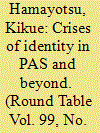

|
|
|
|
|
| Publication |
2010.
|
| Summary/Abstract |
Controversies and frictions related to Islam since the political ascendancy of the opposition coalition, Pakatan Rakyat, after the 8 March 2008 general elections have revealed multiple crises of identity not only in PAS (Islamic Party of Malaysia) and Pakatan Rakyat, but also in broader Malaysian society. It is argued that the pattern of frictions within PAS and Pakatan Rakyat has to do with the diminishing place of Muslim-Malay identity and interests in the avowedly multi-ethnic Pakatan Rakyat regime. It is suggested that these frictions are largely attributed to the distinctive character and emphasis of the Islamisation enterprises sponsored by the ruling regime under the United Malays National Organisation since the 1980s and growing Muslim anxiety and frustration about their position within the Malaysian polity.
|
|
|
|
|
|
|
|
|
|
|
|
|
|
|
|
| 5 |
ID:
044009
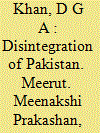

|
|
|
|
|
| Publication |
Meerut, Meenakshi Prakashan, 1985.
|
| Description |
vi, 252p. hbk
|
|
|
|
|
|
|
|
|
|
|
|
Copies: C:1/I:0,R:0,Q:0
Circulation
| Accession# | Call# | Current Location | Status | Policy | Location |
| 026624 | 954.9/KHA 026624 | Main | On Shelf | General | |
|
|
|
|
| 6 |
ID:
127494
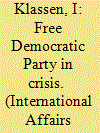

|
|
|
|
|
| Publication |
2013.
|
| Summary/Abstract |
ON SEPTEMBER 22, 2013, the bell tolled for the Free Democratic Party (FDP) when the results of the general elections (a meager 4.8%*), the worst since 1949, left the junior coalition partner to the CDU/CSU Union in the Bundestag outside the German parliament.** An all-time low came only four years after an all-time high of 2009.*** Let us look at the factors behind the party's amazing victories and the no less amazing defeat.
|
|
|
|
|
|
|
|
|
|
|
|
|
|
|
|
| 7 |
ID:
110822
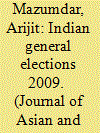

|
|
|
|
|
| Publication |
2012.
|
| Summary/Abstract |
This article argues that the results of the Indian General Elections, 2009, emphasize continuity more than change. Regional political parties, local-level issues and identity-based politics remain significant. The verdict represents a confirmation of established patterns of electoral politics in India and not a break with the recent past.
|
|
|
|
|
|
|
|
|
|
|
|
|
|
|
|
| 8 |
ID:
134022
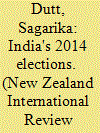

|
|
|
|
|
| Publication |
2014.
|
| Summary/Abstract |
The Indian general elections of 2014 to the 16th Lok Sabha (lower house of Parliament) were held between 7 April and 12 May. More than 500 million people cast their vote in these elections, and it is estimated that the turnout was the highest ever in the country's history. After a vigorous election campaign, the BJP, led by its idiosyncratic leader Narendra Modi, performed better than expected, winning the elections in a landslide and forming the new government. The international response to the BJP's triumph has been positive. The need to attract foreign direct investment was a key feature of the 2014-15 union budget presented by the new government in July.
|
|
|
|
|
|
|
|
|
|
|
|
|
|
|
|
| 9 |
ID:
129948
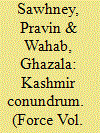

|
|
|
| 10 |
ID:
130186
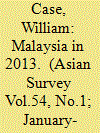

|
|
|
|
|
| Publication |
2014.
|
| Summary/Abstract |
The most important event to take place in Malaysia during 2013 was its general election. The incumbent National Front government was returned to power, though with less than a majority of the popular vote. The government then rewarded Malay supporters with new affirmative action programs. It also repulsed an armed incursion into Sabah launched from the southern Philippines.
|
|
|
|
|
|
|
|
|
|
|
|
|
|
|
|
| 11 |
ID:
158492


|
|
|
|
|
| Summary/Abstract |
Significant theories of democratic accountability hinge on how political campaigns affect Americans’ candidate choices. We argue that the best estimate of the effects of campaign contact and advertising on Americans’ candidates choices in general elections is zero. First, a systematic meta-analysis of 40 field experiments estimates an average effect of zero in general elections. Second, we present nine original field experiments that increase the statistical evidence in the literature about the persuasive effects of personal contact tenfold. These experiments’ average effect is also zero. In both existing and our original experiments, persuasive effects only appear to emerge in two rare circumstances. First, when candidates take unusually unpopular positions and campaigns invest unusually heavily in identifying persuadable voters. Second, when campaigns contact voters long before election day and measure effects immediately—although this early persuasion decays. These findings contribute to ongoing debates about how political elites influence citizens’ judgments.
|
|
|
|
|
|
|
|
|
|
|
|
|
|
|
|
| 12 |
ID:
094949
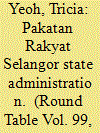

|
|
|
|
|
| Publication |
2010.
|
| Summary/Abstract |
Dubbed the 'political tsunami', the 8 March 2008 elections in Malaysia gave overwhelming results. Selangor is one of the five states now governed by the Pakatan Rakyat coalition. This was a significant win, being the most urban and lucrative state of the country. It has been considered a model state for the Pakatan Rakyat in its desire to position itself as an alternative federal government. This has been the mandate of the new Selangor government, but its execution has been accompanied by numerous obstacles. This paper analyses the distinctive reform measures undertaken by the state government, the challenges faced, ensuing political transformation, and long-term prospects for Pakatan Rakyat in Selangor.
|
|
|
|
|
|
|
|
|
|
|
|
|
|
|
|
| 13 |
ID:
122379
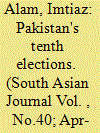

|
|
|
| 14 |
ID:
122844
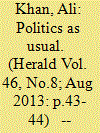

|
|
|
| 15 |
ID:
113924


|
|
|
|
|
| Publication |
2012.
|
| Summary/Abstract |
In 2011, Singaporeans voted in parliamentary and presidential elections. The social networking media, dominated by alternative reporting and commentary, played a significant role in generating political interest and mobilizing oppositional thinking and support. Faced with a stronger oppositional presence and a politically emboldened electorate, the People's Action Party government won the elections but achieved its worst results ever.
|
|
|
|
|
|
|
|
|
|
|
|
|
|
|
|
| 16 |
ID:
133770
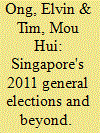

|
|
|
|
|
| Publication |
2014.
|
| Summary/Abstract |
We introduce the concept of a "credibility gap" to explain why the Workers' Party has been more successful than other opposition political parties in recent elections in Singapore. We argue that opposition parties need to overcome a credible commitment problem with the electorate in order to win against hegemonic parties.
|
|
|
|
|
|
|
|
|
|
|
|
|
|
|
|